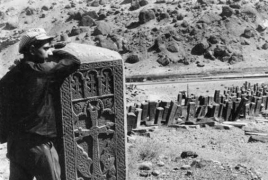RFE/RL: The world looked away when Azerbaijan destroyed historic Armenian cemetery December 10, 2020 - 19:00 AMT PanARMENIAN.Net - RFE/RL has published a fresh article about the historic Armenian cemetery of Jugha (Julfa), before its destruction by Azerbaijani forces in Nakhijevan. In early December 2005, Nshan Topouzian, an ethnic Armenian bishop living in Iran, received an alarming tip-off. According to Iranian border guards, a demolition crew had arrived at the Armenian cemetery of Julfa. After driving through Iran’s rocky northern landscape to the Azerbaijani border, Topouzian was able to capture video footage of the final destruction of a cultural monument that, in its scale and artistry, was unlike anything else. Over several days, hundreds of ancient cross-stones, or "khachkars," were broken into rubble by men in military uniforms and dumped into the river between Azerbaijan and Iran. Khachkars are stone slabs historically used by Armenian Christians as memorials to the dead or to mark the location of significant events. Armenian tradition holds that no two khachkars are alike and all are sacred. They are often carved with lace-like details and fantastical creatures whose identity is lost to time. Despite extensive documentary evidence of the Julfa cemetery’s destruction, Azerbaijani officials have either denied the cemetery was Armenian or that it ever existed in the first place. But the 2005 destruction, which was only the final and most brazen demolition of the cemetery, went largely unnoticed by the outside world despite shocking Armenians and some Azerbaijanis. An Azerbaijani historian, who asked not to be named, says the destruction at Julfa offended not only Armenians but also many Azerbaijanis in Naxcivan: “They saw it as a part of their history, too,” and says school groups would often be taken to explore the historical site. Many people have criticized the silence from UNESCO after the 2005 razing of Julfa. An investigative report by the Organized Crime and Corruption Reporting Project found that in 2012-2014, shadowy companies linked to Azerbaijan paid $468,000 to Kalin Mitrev, the husband of UNESCO’s director-general at the time. Mitrev has said the payments were legitimate fees for consultancy services. In response to an e-mailed query from RFE/RL, UNESCO Chief of Communications Matthieu Guevel did not directly address the organization's lack of response to the 2005 Julfa destruction, saying only that UNESCO "has expressed on several occasions, in public and via diplomatic channels, its concern for the protection of cultural heritage everywhere in the world." In light of reports of the possible destruction of cultural heritage sites by soldiers during the most recent conflict between Azerbaijan and Armenia, Guevel says UNESCO is "now working with all concerned parties to dispatch a mission on the ground in Nagorno-Karabakh, with a view to assessing the situation and protecting the cultural heritage of this region." Six total incidents have burned 19 old-growth trees. Friday night 8 trees were torched along the beautiful main entrance. The EU does not intend to conduct military exercises with Armenia, Lead Spokesperson for EU Foreign Affairs and Security Policy Peter Stano says. Hikmet Hajiyev has said that there is no place for USAID operation in Azerbaijan any longer. A telephone conversation between Putin and Pashinyan before the CSTO summit is not planned, Peskov says. Partner news |